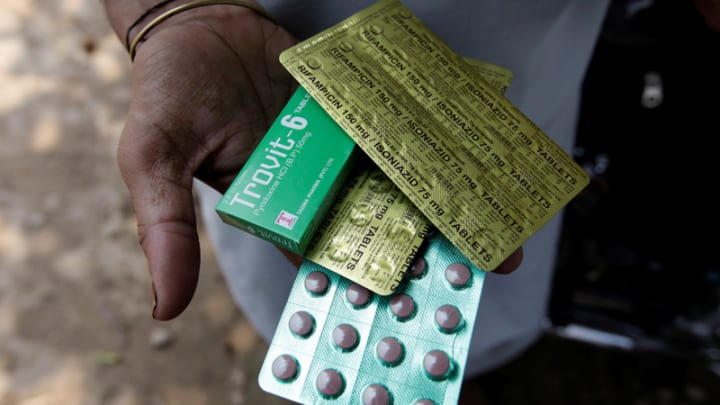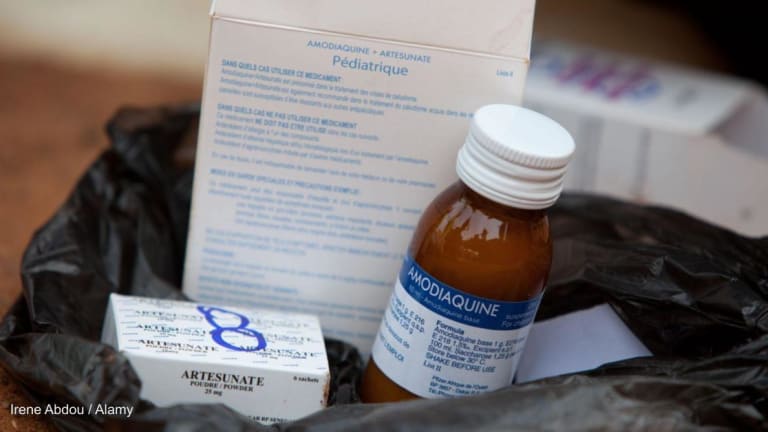
MANILA — Experts advising the U.S. Food and Drug Administration on marketed and investigational drugs for infectious diseases and disorders were divided on whether the regulatory agency should approve a new drug as part of a proposed combination therapy for highly resistant tuberculosis.
The majority of the independent experts — 14 out of 18 — advising the regulatory agency voted favorably last month. But the remaining four found insufficient evidence on efficacy and safety of the TB Alliance’s oral anti-TB drug pretomanid when used in combination with bedaquiline and linezolid, or BPaL.
“The goal is not just to get it registered and to have it available in the U.S., but especially to have it available in the countries that have major TB problems.
— Dr. Mel Spigelman, president and CEO, TB AllianceWhile the drug has been administered in clinical trials involving 1,200 participants from across 14 countries, there’s been only one clinical trial in South Africa cited testing the drug as part of the proposed combination therapy.
Susan Ellenberg, one of the experts who voted “no,” recognized the “desperate” need for new drugs and shorter and less toxic regimens tackling highly resistant TB, but argued that there should be “definite evidence” it works.
More on TB:
► Tuberculosis and NCDs jostle for space in global health agenda
“I think people in these desperate situations are every bit as entitled, if not more entitled, to have drugs where there's a definitive evidence that they are going to work and I really worry about going down the road of … adding more drugs where we don't have information about whether they actually work,” she said.
Another member who voted “no” shared concerns on the potential of the drug being misused once out in the market by being combined with other TB drugs that were not part of the study, but are cheaper.
“New drugs are certainly needed. We're teetering on the doorstep of the post-antibiotic era, but we don't need to rush headlong into potential disaster by adding a new drug to the hit list of XDR-TB [extensively drug-resistant TB] by not having a good understanding of what we're adding to the arsenal against TB,” said Peter Weina.
The ‘yes’ vote
Yet 14 of the experts stated there’s sufficient evidence on the efficacy of pretomanid as part of the combination therapy. A number of them weighed the risks or some of the reported safety concerns against the need for an effective treatment for highly-resistant TB.
“I voted ‘yes’ because I think that it's possible to die from a treatment or it's possible to die from a disease. And I think that given ... that TB is the greatest killer of people worldwide from infectious diseases, this is a compelling treatment,” said Joan Hilton, one of the experts.
Phillip LoBue, another committee member, underscored the limited and difficult treatment options that exist for patients suffering from XDR-TB.
“I would say there is no such thing as a safe regimen for the treatment of XDR-TB,” he said, adding that any patient treated with the drug as part of the proposed regimen should be monitored and treated only by experts in the field.
One of the committee members said her decision to recommend the drug as part of the treatment regimen was influenced by the testimony of one of the TB patients, a man diagnosed with multidrug-resistant TB back in 2013 who had to undergo one and a half years of treatment.
In his testimony, he said he had to take nine to 10 TB drugs a day, and a “toxic” injection for 6 months. He suffered both physical and mental exhaustion while on treatment and fell into a depression.
Many of those who voted “yes” emphasized they were voting in favor only of the proposed regimen, and not of a single drug. They also recommended the need for further studies, such as looking at the treatment regimen’s impact on fertility and patients with liver disease.
The evidence
The combination therapy is designed to help address the growing problem of extensively drug-resistant TB, treatment-intolerant multidrug-resistant TB, and treatment nonresponsive MDR-TB. There are an estimated 460,000 cases of MDR-TB globally in 2017, and 8.5% of MDR-TB cases had XDR-TB, according to the latest available data by the World Health Organization.
Only a little over half or 55% of MDR-TB patients are currently successfully treated, according to the U.N. health agency. Treatment consists of injections and multiple drugs to be taken often for more than a year, and could have serious adverse effects such as permanent hearing loss and damaged kidneys.
Treatment has been too long, too complex, and highly toxic. It applies what Dr. Mel Spigelman, president and CEO of the TB Alliance, described as a “kitchen sink approach” where four, or five, or as much as nine drugs are used together to treat a patient.
The approach is “just use everything you have in your arsenal so to speak, even though the data on any one of them is probably lacking. And the data on using all of them together is nonexistent,” he told Devex.
The TB Alliance’s proposed BPaL regimen hopes to put in place a more simplified treatment scheme consisting of only three drugs, and with a shorter treatment period of six to nine months.
The clinical trial in South Africa showed an efficacy rate of approximately 90% in the first 104 patients, six months after the end of treatment and another six months of follow-up. Final data on the full 109 patients is forthcoming, said Thomas Lynch, communications manager at TB Alliance, told Devex.
But the efficacy rate of the data presented to the U.S. FDA convinced enough experts of the committee, moving them to vote in favor of the drug as part of the BPaL regimen despite some reported adverse events and limitations in the trial data.
All 109 participants in the clinical trial reported at least one adverse side effect from BPaL. Nearly 70% suffered peripheral neuropathy or damaged peripheral nerves in the body, mostly linked to the drug linezolid. Patients who experienced adverse effects discontinued linezolid or adhered to a lower dosage.
Six patients died while on treatment. An autopsy report showed they died from “severely disseminated TB or TB-related symptoms,” Lynch said.
“This would be the cause of enrolling patients who really are just in the sickest form of this disease,” he said.
Lynch said there’s another clinical trial being run by Médecins Sans Frontières called “TB PRACTECAL” that evaluates three different regimens, one of them the BPaL regimen. But that was not included in the presentation, he said.
Building tuberculosis awareness in low-risk countries
Despite the international focus on tuberculosis, there still remains an important challenge — more funding to deliver programs and research to eliminate the disease by 2030.
Next steps
The deliberations took place about two months before the U.S. Food and Drug Administration is expected to make a decision whether to approve the drug as part of the proposed combination therapy for highly resistant TB.
Following the advisory committee’s recommendations, the TB Alliance is currently addressing additional questions from FDA before the latter makes a decision on approving pretomanid as part of the proposed treatment regimen.
“We've submitted it for use only as part of the BPaL regimen, not for use in any other context. Ultimately, however, the FDA makes the decision based on their review of our submission,” Lynch said.
Under the Prescription Drug User Fee Act the regulatory agency is expected to make a decision mid-August, Spigelman said.
If the U.S. FDA approves the drug, the TB Alliance and its pharmaceutical partner, Mylan, will have permission to market the drug in the U.S.
But that’s just the “tip of the iceberg,” Spigelman said.
“The goal is not just to get it registered and to have it available in the U.S., but especially to have it available in the countries that have major TB problems. But having a U.S. approval certainly is a strong signal to other countries and to other agencies that if the U.S. FDA thought something was worthy of approval, then that means a lot,” he said.
The drug and the regimen are currently undergoing a similar regulatory process in Europe. TB Alliance is also in the process of submitting their data to WHO, which provides recommendations whether to include the drug in their TB treatment guidance.
The million-dollar question
Next to the regulatory approval however is the million-dollar question: How affordable will it be?
As a nonprofit, Spigelman said part of the organization’s “credo” is to ensure anything they work on will be affordable, and that is built in all of their contractual arrangements. The organization believes that the “best route to affordability” is through the presence of generic competition.
But one also needs to look at sustainability, ensuring there is enough profit for the players who can produce high-quality drugs to continue producing them.
“No one would argue, for example, that if you sold a pill for a penny or you sold a treatment for penny, that that would be affordable. But if that's what you sold it for and that's all a manufacturer would get, they would stop making it. And then yes, you can say it's affordable, but it's not available. That is to no one's benefit,” he said.
He added there are other factors influencing affordability apart from the cost of drugs, such as length of hospitalization and the ability of patients to go back to work.
He said talking about drug pricing at this point, however, is “premature” given the drug hasn’t even been approved yet.
“We just went through talking about, you know, what happens if it doesn't get approved. So pricing is announced when and if a drug is approved,” he said.
TB Alliance’s license agreement with Mylan for pretomanid for “certain low- and middle-income countries” will be nonexclusive, but Mylan will have exclusive licensing for commercializing pretomanid as part of the proposed combination regimen in high-income markets, according to a news release in April.
The full price of the regimen will depend on pricing set by the different companies holding licensing for each drug. Janssen Pharmaceuticals maintains exclusive license for bedaquiline.

